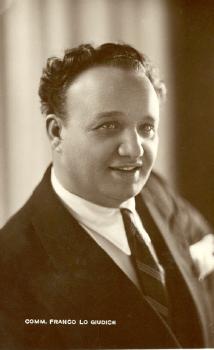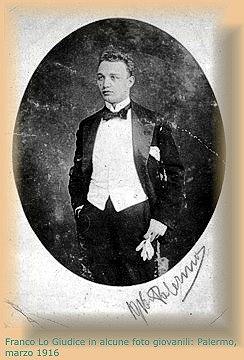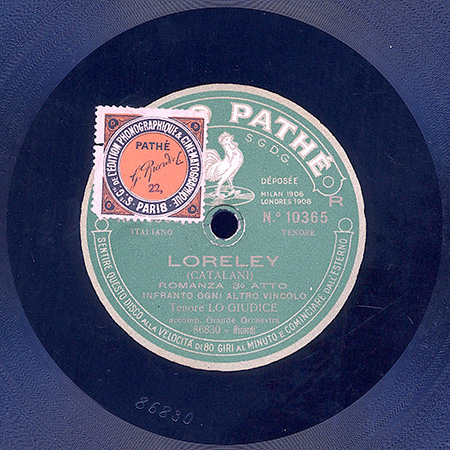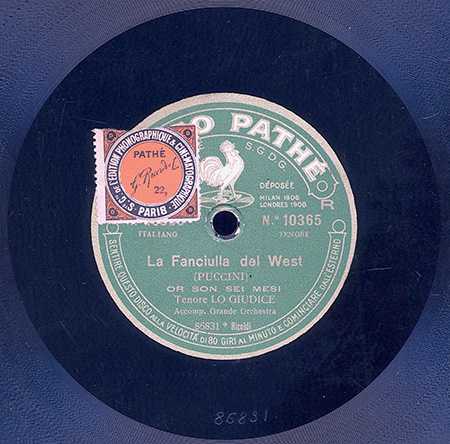Franco Lo Giudice
14 March 1893 Paternò – 19 August 1990 Catania
Franco Lo Giudice, the third of twelve children, was born March 14th, 1893 in Paternò. In the early twentieth century, while attending primary
school, he was passionate about opera listening to records of Enrico Caruso.
Upon recommendation of maestro Antonio Catania in 1911, Lo Giudice went to study singing at the San Pietro Majella conservatory in Naples with
maestro Benjamin Carelli. In 1913, he returned to Sicily and continued his studies in Catania with maestro Matteo Adernò.
In 1914, his operatic debut took place while he was a soldier in the Italian army. An impresario named Borboni managed
to sign Lo Giudice for Pagliacci (Beppe) at the Teatro Biondo in Palermo – the singer got 5 Lire, his officers free tickets.
After the war he remained in Milan where his agent was located. One day, his agent greeted him at the office
exclaiming, Here is Alfredo. But my name is Franco, replied Lo Giudice. However, his agent's words were addressed towards the others present,
particularly towards the impresario of the Politeama
in Livorno, maestro Dell'Acqua. Dell'Acqua asked whether he had ever sung the role. Yes, replied the bold liar, in Palermo.
His real debut was at the Politeama Livorno in November 1919 with an initial
commitment for eight nights, with additional three nights on top, while receiving in homage a free suit by the best tailor in town
for an agreed two hundred lire per night.
Thus began his ascent to fame in Italian and foreign opera houses, with the most influential singers of the moment,
such as Rosa Raisa, Viglione Borghese, Carmelo Maugeri, Tancredi Pasero, Gilda Dalla Rizza, Toti Dal Monte, Bianca Scacciati,
Carmen Melis, Maria Laurenti, Lina Bruna Rasa, Ebe Stignani, Elvira Casazza, Mafalda Favero, Maria Caniglia, Iva Pacetti, Gina Cigna.
With his lirico-spinto voice, Lo Giudice had a thirty years brilliant career with more than 60 operas in his repertoire,
and many world premieres, collecting awards, honors, flattering judgments by critics and enthusiastic approval by the public.
After Livorno, again in 1919, he sang at the Dal Verme (La fanciulla del West) and between 1920 and 1922, Lo Giudice had
a
memorable first season in Trieste (Boris Godunov), at the Verdi in Padua (Madama Butterfly), at the Malibran in Venice (Ruy Blas),
at the Balbo in Turin (La fanciulla del West), at the Giglio in Lucca (Lodoletta), at the San Carlo (Wally, Andrea Chénier,
Cavalleria rusticana, Boris Godunov), and at the Teatro Costanzi (Andrea Chénier).
Also in 1922, he made his debut at the Amphitheater Cangi in Catania with Cavalleria rusticana. In 1923, he sang at the
Adriano in Rome (Loreley, La fanciulla del West, roles so congenial to his voice).
In a performance of a Puccini opera, in Rome, Puccini heard him and was so impressed as to extend,
through the manager, his compliments to Lo Giudice, apologizing for not being able to meet him the same night as he had to leave urgently.
On his return, Puccini was pleased to meet him and they were planning something together.
However, Puccini died soon after in Brussels.
In 1924, Lo Giudice met Riccardo Zandonai for the first time at the
Municipale in Piacenza, where Lo Giudice was hired to sing three performances of Giulietta e Romeo: the beginning of a happy and successful collaboration.
On February 19th, Zandonai conducted his work and called him for a private rehearsal where Zandonai wanted to discuss peculiar points
that he wanted to be carried out during the performance.
In the evening, a flawless execution is greeted by an ovation. Still in 1924, Zandonai presented the work with Lo Giudice at the Grande in
Brescia, at the Teatro Regio in Turin, at the Massimo Bellini in Catania, at the Politeama
Fiorentino, and at the Petruzzelli in Bari.
Zandonai, preparing I cavalieri di Ekebù, invited Lo Giuduce to his home
in Pesaro, from 19 June to 6 July 1924, to study with him the new work, and also to make him
learn his Conchita.
Arturo Toscanini was rarely willing to accept the works of
contemporary composers. However, I cavalieri di Ekebù convinced him for the originality of the subject, the inspiration of the beautiful
human drama, the romance of a love story full of strong feelings of passion, and the characterization of dissolute characters.
The appreciation of Toscanini for Zandonai was also evident when the managers of Casa Ricordi recommended him to conclude the unfinished Turandot.
The negotiations, however, were closed by the veto of Puccini's son Antonio.
Toscanini himself conducts the premiere of I cavalieri di Ekebù at La Scala. Zandonai offered Lo Giuduce an autographed picture
First and great interpreter of Giosta in I cavalieri di Ekebù.
At La Scala, Lo Giudice, at the height of technical perfection, was also chosen to sing La Wally; he sang La cena delle
beffe and a reprise of I cavalieri di Ekebù (season 1925/26), L'amore dei tre re (December 1926), Turandot (1930),
La fanciulla del West (1930); in 1931 Nerone by Boito; and in 1932 La notte di Zoraima by Montemezzi.
Lo Giudice's intense artistic activity is confirmed by thrilling performances at the Teatro Comunale in Bologna in 1925 (La cena delle
beffe), in 1926 at the Teatro Regio in Turin (La cena delle beffe), at the Politeama Fiorentino (Madame Sans-Gène) and at the Arena
di Verona (Nerone), in 1927 at the Teatro Comunale in Bologna (Conchita), at the Regio in Parma (Turandot) and
at the San Carlo (Nerone).
On February 4th, 1928, Lo Giuduce sang in another memorable world premiere: Giuliano by Zandonai
at the San Carlo. The soprano Maria Laurenti remembered: Maestro Zandonai
asked me if I wanted to be the first Reginella in his new opera, Giuliano, next to the great tenor Franco Lo Giudice, matchless
interpreter of the works of Zandonai. I accepted enthusiastically with deep gratitude.
The chronicle of the time reported a great success of this memorable performance:
Maria Laurenti won a big success in the role of Reginella, the whole sprinkled with lyricism, a gentle tone, purity
of sound, freshness of feeling of a lyric soprano voice that caresses the ear, and the technical perfection of her
singing. Lo Giudice has confirmed his reputation of a great dramatic tenor and sensitive artist. It is unlikely that another tenor in
this role filled with heroism, passion and mystical compunction can surpass him. His ringing voice, the plasticity of his phrasing,
the volume of his voice produces a warmth resulting in a maximum of effectiveness. He is an ideal Giuliano. (Saverio Procida in Il Mezzogiorno, 5/6 February 1928)
In the inaugural season of Costanzi in Rome, he sang Nerone with the great baritone Carmelo
Maugeri, and was the first interpreter of Dafni by Mulè. He also sang Giuliano.
In 1928, he sings in Mantua, at the Malibran in Venice, at the Augusteo in Rome (Les béatitudes), Bergamo, Varese, Treviso (Dejanice),
Bologna and Modena.
In 1935, to celebrate the centenary of Bellini, Lo Giudice sang in I Capuleti e i Montecchi and Norma in Catania,
I Capuleti e i Montecchi at the Carlo Felice in Genoa, Norma at the Teatro Regio in Turin.
He had great success in Norma at the Massimo Bellini with Gina Cigna, skillful and evocative soprano.
Further memorable performances in 1936 in Turandot at the San Carlo, in Il piccolo Marat at Lirico in Milan, and in Verdi's Requiem.
In the following years, Lo Giudice sang among other works: Turandot, La Wally, Andrea Chénier, La fanciulla del West.
With Andrea Chénier, Lo Giudice closed his career in Florence in December 1944. His career covered the
period during and between the two wars.
His Italian career can be summarized as follows:
1923: Teatro Adriano, Rome: Loreley and Fanciulla del West (which earned him compliments by Puccini)
1924: Teatro Comunale, Piacenza: Giulietta e Romeo by Zandonai, which earned him compliments by Zandonai, this time.
They became close friends. Joint performances of the same opera followed, still in 1924, in Brescia, Torino, Catania
and Bari.
Augusteo, Rome: Verdi's Requiem
1925: 7 March, La Scala, Milan: world premiere of Zandonai's I cavalieri di Ekebù, with Lo Giudice, Elvira Casazza, Maria
Luisa Fanelli, Benvenuto Franci, and Toscanini conducting
Lo Giudice would return to La Scala in 1926, 1930, 1931 and 1932, and sing there in La Wally, La cena delle beffe, Turandot,
Nerone, L'amore dei tre re, and La notte di Zoraima (the two latter by Italo Montemezzi)
1926: Politeama, Florence: Madame Sans-Gêne (by Giordano)
1927: Teatro Comunale, Bologna: Conchita (by his friend Zandonai)
1928: 4 February, Teatro San Carlo, Naples: world premiere of Giuliano, again by Zandonai, with Lo Giudice and Maria Laurenti
Teatro Reale dell'Opera, Rome: Dafni (by Mulè, with Carmelo Maugeri)
Augusteo, Rome: Les béautitudes (by Franck)
Treviso: Dejanice (by Catalani)
1934: Teatro Massimo, Palermo: Galatea (by Savasta)
1935: Teatro Bellini, Catania: I Capuleti e i Montecchi and Norma
1936: Teatro Lirico, Milano: Il piccolo Marat (by Mascagni)
Torino: Verdi's Requiem
1937: Teatro Massimo, Palermo: Vespri siciliani
In 1939, he played a leading role in the musical film Troppo tardi t'ho conosciuta.
Outside Italy, Lo Giudice sang at the Municipal in Rio de Janeiro (Turandot, Aida), Santiago
de Chile (Aida, Turandot, Nerone, Boris Godunov, Salome, Cavalleria rusticana, La traviata), Nice (La cena delle
Beffe with Maugeri), Royal Opera House in Budapest (La traviata, Tosca, Pagliacci), and at Covent Garden (Madama Butterfly).
From 1952 to 1961, Lo Giudice taught singing at the Conservatorio Bellini in Catania at the invitation by the president of the conservatory.
In 1950, he married Rosetta Brusadelli (a daughter Stella was born in 1955) in Milan, where he built a splendid palace in Via San Gallo.
Salvatore D. Randazzo and Bruno Cagnoli
Pathé 86833
Pathé 86832
In RA format
Repertory
Pagliacci – Palermo, Autumn 1915
La traviata – Livorno, October 1919
La fanciulla del West – Milano, December 1919
Pamperos – Milano, December 4, 1919
Boris Godunov – Trieste, February 14, 1920
La Wally – Lugo di Ravenna, November 1920
Madama Butterfly – Padova, December 25, 1919
Ruy Blas – Venezia, January 1921
Lodoletta – Lucca, April/May 1921
Andrea Chénier – Napoli, January 25, 1922
Cavalleria rusticana – Napoli, February 23, 1922
Silvano – Pisa, 1922
Fra Diavolo – Pisa, 1922
Loreley – Reggio Emilia, December 25, 1922
I compagnacci – Firenze, January 27, 1923
Carmen – Sampierdarena, December 22, 1923
Giulietta e Romeo – Piacenza, February 14, 1924
Tosca – Montecatini, August? 1924
Requiem – Roma, Teatro Augusteo, 21 December 1924
I cavalieri di Ekebù – Milano, March 7, 1925
Antemoenta – Bergamo, September 29, 1925
La cene delle beffe – Bologna, November 21, 1925
Il trovatore – Venezia, Teatro Malibran, 1925
L'amore dei tre re – Milano, March 27, 1926
Madame Sans-Gêne – Firenze, April 29, 2926
Turandot – Milano, May 8, 1926
Nerone (Boito) – Verona, July 24, 1926
Conchita – Bologna, November 22, 1927
Giuliano – Napoli, February 4, 1928
Dafni – Roma, March 14, 1928
Manon Lescaut – Bergamo, September 8, 1928
Dejanice – Treviso, October 31, 1927
Salome – Santiago, May 3, 1930
Francesca da Rimini – Palermo, March 7, 1931
La notte di Zoraima – Milano, February 2, 1932
Galatea – Palermo, March 18, 1934
I Capuleti e i Montecchi – Catania, January 5, 1935
Norma – Catania, January 17, 1935
Il piccolo Marat – Bari, December 28, 1935
Baldo – Napoli, February 19, 1936
I vespri siciliani – Palermo, March 31, 1937
Fiorella – Parma, February 15, 1938
Franco Lo Giudice was also listed for the Andrea Chénier at the Teatro Verdi in Torino in 1920 and for Francesca da Rimini
at the Teatro Comunale in Cesena in 1925.
Chronology
| 1914 |
|
|
|
| 10 |
Palermo |
Teatro Biondo |
PAGLIACCI (Peppe) |
| |
|
|
|
| 1919 |
|
|
|
| 10 |
Livorno |
Politeama |
TRAVIATA (Alfredo) |
| 12 |
Milano |
Taetro Carcano |
PAMPEROS di A. Ottolenghi |
| |
Trieste |
Teatro Verdi |
BORIS GODUNOV |
| |
|
|
|
| 1920 |
|
|
|
| 03 |
Torino |
Teatro Verdi |
ANDREA CHÉNIER (Chénier) |
| 08 |
Torino |
Teatro Verdi |
WALLY (Hagenbach) |
| |
Suzzara |
Teatro Sociale |
WALLY (Hagenbach) |
| |
|
|
|
| 1921 |
|
|
|
| 01 |
Venezia |
Teatro Malibran |
RUY BLAS (Ruy Blas) |
| 04 |
Lucca |
Teatro Del Giglio |
LODOLETTA (Flammen) |
| 09 |
Monza |
Società Corale |
CONCERTO |
| |
|
|
|
| 1922 |
|
|
|
| 01/03 |
Napoli |
Teatro San Carlo |
ANDREA CHÉNIER (Chénier) / BORIS GODUNOV (Dmitrij) / CAVALLERIA
RUSTICANA (Turiddu) / WALLY (Hagenbach) |
| 04 |
Roma |
Teatro dell'Opera |
ANDREA CHÉNIER (Chénier) |
| 07 |
Catania |
Anfiteatro Gangi |
CAVALLERIA RUSTICANA (Turiddu) |
| 08 |
Milano |
Teatro Carcano |
CONCERTO |
| 10 |
Vercelli |
Teatro Civico |
WALLY (Hagenbach) |
| 11 |
Pisa |
Teatro Verdi |
CAVALLERIA RUSTICANA (Turiddu) / SILVANO (Silvano) |
| 12 |
Reggio Emilia |
Teatro Municipale |
LORELEY (Walter) |
| |
|
|
|
| 1923 |
|
|
|
| 04 |
Livorno |
Teatro Rossini |
CAVALLERIA RUSTICANA (Turiddu) / SILVANO (Silvano) |
| 12 |
Sampierdarena |
Teatro Gustavo Modena |
CARMEN (Don José) |
| |
Firenze |
Teatro Della Pergola |
I COMPAGNACCI di P. Riccitelli |
| |
Roma |
Teatro Adriano |
LORELEY (Walter) |
| |
|
|
|
| 1924 |
|
|
|
| 01 |
Bergamo |
Teatro delle Società |
FANCIULLA DEL WEST (Johnson) / SILVANO (Silvano) |
| 01 |
Piacenza |
Teatro Municipale |
GIULIETTA E ROMEO di R. Zandonai (Romeo) |
| 03 |
Catania |
Teatro Bellini |
GIULIETTA E ROMEO di R. Zandonai (Romeo) / FANCIULLA DEL WEST (Johnson) |
| 03 |
Torino |
Teatro Regio |
GIULIETTA E ROMEO di R. Zandonai (Romeo) |
| 04 |
Firenze |
Politeama Fiorentino |
GIULIETTA E ROMEO di R. Zandonai (Romeo) |
| 08/09 |
Montecatini |
Teatro Trianon |
ANDREA CHÉNIER (Chénier) / TOSCA (Cavaradossi) |
| 11 |
Roma |
Teatro Augusteo |
REQUIEM di G. Verdi |
| |
|
|
|
| 1925 |
|
|
|
| 01 |
Bari |
Teatro Petruzzelli |
GIULIETTA E ROMEO di R. Zandonai (Romeo) |
| 03 |
Milano |
Teatro La Scala |
I CAVALIERI DI EKEBÙ di R. Zandonai (Giosta) / WALLY (Hagenbach) |
| 08 |
Cesena |
Teatro Comunale |
GIULIETTA E ROMEO di R. Zandonai (Romeo) |
| 09 |
Rimini |
Teatro Vittorio Emanuele |
I CAVALIERI DI EKEBÙ di R. Zandonai (Giosta) |
| 10 |
Bergamo |
Teatro Donizetti |
ANTEMOENTA di V. Gusmini |
| 11 |
Bologna |
Teatro Comunale |
LA CENA DELLE BEFFE (Giannetto) |
| 12 |
Milano |
Teatro La Scala |
I CAVALIERI DI EKEBÙ di R. Zandonai (Giosta) / LA CENA DELLE BEFFE
(Giannetto) |
| |
Venezia |
Teatro Malibran |
TOSCA (Cavaradossi) / TROVATORE (Manrico) |
| |
|
|
|
| 1926 |
|
|
|
| 01 |
Torino |
Teatro Regio |
LA CENA DELLE BEFFE (Giannetto) |
| 03 |
Milano |
Teatro La Scala |
AMORE DEI TRE RE di I. Montemezzi (Avito) / TURANDOT (Calaf) |
| 08 |
Verona |
Arena |
NERONE di A. Boito (Nerone) |
| 11/12 |
Milano |
Teatro La Scala |
TURANDOT (Calaf) / AMORE DEI TRE RE di I. Montemezzi (Avito) |
| |
Faenza |
Teatro Masini |
CARMEN (Don José) |
| |
Firenze |
Politeama Fiorentino |
MADAME SANS-GÊNE di U. Giordano |
| |
Lecce |
Politeama Greco |
AMORE DEI TRE RE di I. Montemezzi (Avito) |
| |
Rimini |
Teatro Vittorio Emanuele |
TURANDOT (Calaf) |
| |
Roma |
Teatro Argentina |
TURANDOT (Calaf) |
| |
|
|
|
| 1927 |
|
|
|
| 01 |
Piacenza |
Teatro Municipale |
TURANDOT (Calaf) |
| 02 |
Parma |
Teatro Regio |
TURANDOT (Calaf) |
| 11 |
Bologna |
Teatro Comunale |
CONCHITA di R. Zandonai (Mateo) |
| |
Ancona |
Teatro Delle Muse |
TURANDOT (Calaf) |
| |
Bologna |
Teatro Comunale |
CONCHITA di R. Zandonai (Mateo) |
| |
Mantova |
Teatro Sociale |
TURANDOT (Calaf) |
| |
Milano |
Teatro La Scala |
AMORE DEI TRE RE di I. Montemezzi (Avito) / TURANDOT (Calaf) |
| |
Napoli |
Teatro San Carlo |
NERONE di A. Boito (Nerone) |
| |
|
|
|
| 1928 |
|
|
|
| 02 |
Mantova |
Teatro Sociale |
FRANCESCA DA RIMINI (Paolo) |
| 02/04 |
Roma |
Teatro dell'Opera |
NERONE di A. Boito (Nerone) / DAFNI di G. Mulè (Dafni) / GIULIANO di
R. Zandonai (Giuliano) |
| 11 |
Bologna |
Teatro Comunale |
FANCIULLA DEL WEST (Johnson) |
| 12 |
Borgo Rossignano |
Teatro Nuova Italia |
CONCERTO |
| |
Bologna |
Teatro Comunale |
FANCIULLA DEL WEST (Johnson) |
| |
Mantova |
Teatro Sociale |
FRANCESCA DA RIMINI (Paolo) |
| |
Napoli |
Teatro San Carlo |
GIULIANO di R. Zandonai (Giuliano) |
| |
Treviso |
Teatro Sociale |
DEJANICE di A. Catalani (Admeto) |
| |
|
|
|
| 1930 |
|
|
|
| 01 |
Modena |
Teatro Municipale |
WALLY (Hagenbach) |
| 01 |
Parma |
Teatro Regio |
TURANDOT (Calaf) |
| 01 |
Milano |
Teatro La Scala |
FANCIULLA DEL WEST (Johnson) / TURANDOT (Calaf) |
| 03 |
Catania |
Teatro Bellini |
TURANDOT (Calaf) |
| 03 |
Roma |
Teatro Costanzi |
DAFNI di G. Mulè (Dafni) |
| 10 |
Santiago del Cile |
Teatro Municipal |
BORIS GODUNOV (Dmitrij) / PAGLIACCI (Canio) / SALOME (Erode) / TURANDOT
(Calaf) |
| |
|
|
|
| 1931 |
|
|
|
| 03 |
Palermo |
Teatro Massimo |
FRANCESCA DA RIMINI (Paolo) |
| 04 |
Milano |
Teatro La Scala |
NERONE di A. Boito (Nerone) |
| 07 |
Livorno |
Teatro Goldoni |
TURANDOT (Calaf) |
| |
|
|
|
| 1932 |
|
|
|
| 02 |
Milano |
Teatro La Scala |
LA NOTTE DI ZORAIMA di I. Montemezzi (Muscar) |
| 03 |
Cesena |
Teatro Comunale |
ANDREA CHÉNIER (Chénier) |
| 09 |
Prato |
Politeama Banchini |
WALLY (Hagenbach) |
| 10 |
Genova |
Politeama Genovese |
ANDREA CHÉNIER (Chénier) |
| |
|
|
|
| 1933 |
|
|
|
| 10 |
Rovigo |
Teatro Sociale |
CARMEN (Don José) |
| |
|
|
|
| 1934 |
|
|
|
| 01 |
Novara |
Teatro Coccia |
LA CENA DELLE BEFFE (Giannetto) |
| 01 |
Parma |
Teatro Regio |
LA CENA DELLE BEFFE (Giannetto) |
| 02 |
Modena |
Teatro Municipale |
ANDREA CHÉNIER (Chénier) |
| 04 |
Palermo |
Teatro Massimo |
FANCIULLA DEL WEST (Johnson) / GALATEA di A. Savasta (Aci) |
| 09 |
Rio de Janeiro |
Teatro Municipal |
AIDA (Radames) / TURANDOT (Calaf) |
| |
Roma |
Eiar |
LORELEY (Walter) |
| |
|
|
|
| 1935 |
|
|
|
| 01 |
Genova |
Teatro Carlo Felice |
I CAPULETI E I MONTECCHI di V. Bellini |
| 01 |
Torino |
Teatro Regio |
IL DIBUK di L. Rocca (Hanan) / NORMA (Pollione) |
| |
|
|
|
| 1936 |
|
|
|
| 01 |
Bari |
Teatro Petruzzelli |
IL PICCOLO MARAT (Marat) |
| 01 |
Torino |
Teatro Regio |
TURANDOT (Calaf) |
| 08 |
Noto |
Teatro Littoriale |
TURANDOT (Calaf) |
| |
Napoli |
Teatro San Carlo |
BALDO di G. A. Cicogna (Baldo) / TURANDOT (Calaf) |
| |
|
|
|
| 1937 |
|
|
|
| 03 |
Palermo |
Teatro Massimo |
I VESPRI SICILIANI (Arrigo) |
| 08 |
Fano |
Teatro Della Fortuna |
WALLY (Hagenbach) |
| 11 |
Ascoli Piceno |
Teatro Ventidio Basso |
I COMPAGNACCI di P. Riccitelli |
| 12 |
San Severo |
Teatro Comunale |
ANDREA CHÉNIER (Chénier) |
| |
|
|
|
| 1938 |
|
|
|
| 02 |
Parma |
Teatro Regio |
FIORELLA di I. Brancucci (Eugenio di Beauharnais) |
| 11 |
Ascoli Piceno |
Teatro Ventidio Basso |
TURANDOT (Calaf) |
| 08 |
Noto |
Teatro Littoriale |
TURANDOT (Calaf) |
| |
|
|
|
| 1939 |
|
|
|
| 02 |
Sanremo |
Teatro del Casinò |
TURANDOT (Calaf) |
| 08 |
Trieste |
Castello di San Giusto |
TURANDOT (Calaf) |
Discography
Fonotipia, Milano, 11 July 1911
xPh4752 Graf von Luxemburg: Amor, raggio di sol X92801
with Emma Vecla & Gino Vannutelli
Pathé acoustic, 1922/23
86828 Andrea Chénier: Colpito qui m'avete 10364
86829 Andrea Chénier: E volli pien d'amore 10364
86830 La fanciulla del West: Or son sei mesi 10365
86831 Loreley: Infranto ogni altro vincolo 10365
86832 Lodoletta: Ah ritrovarla 10366
86833 Il piccolo Marat: Comprendi quello che ho fatto 12589
with Anna Sassone-Soster
86834 Il piccolo Marat: Avrai nella mia mamma 12589
with Anna Sassone-Soster
86849 Il piccolo Marat: Ah se tu m'ami 10366
86850 Pagliacci: No Pagliaccio non son 10367
86851 Il trovatore: Deserto sulla terra 10367
Grammofono, Milano, 11 December 1924
CK1806-1 Nerone: Queste ad un lido fatal 2-052271, DB819
Grammofono, Milano, 13 December 1924
CK1809-2 Nerone: O come vieni a errar 2-052272, DB820
CK1810-2 Nerone: Scendi scendi 2-052273, DB820
Grammofono (La Voce del Padrone), Milano, 3 to 12 September 1929
CM-1056 Messa da Requiem (Verdi), complete recording with D 1751-1760
to Maria Luisa Fanelli (s), Irene Minghini-Cattaneo (ms), Ezio
1078 Pinza (bs). Orchestra & chorus of La Scala, Carlo Sabajno
Columbia Electric 1939
WB9720 Oggi lo so (Redi) * GQ7214
WB9721 Come le rose (Lama) * GQ7214
WB9723 Amore, amor (Redi) * GQ7215
WB9722 La canzone del cuore (Redi) * GQ7215
WB2072 Luna sul mar * OQ2072
WB5390 Sei tu l'amor * OQ2072
WB5444 Cantani ancor * OQ2071
WB5445 Dora * OQ2071
* from film: "Troppo tardi t'ho conosciuta"
I wish to thank Juan Dzazópulos E. for the new discography. One addition from
Gesellschaft für historische Tonträger, Wien.
Many thanks to Anton Bieber for the Loreley and Fanciulla recordings plus label scans.
Reference: Cagnoli & Randazzo: Il tenore Franco Lo Giudice nel centenario della
nascita di Riccardo Zandonai, International Ediemme, 1984.
Reference for the chronological information Roberto Marcocci's website
|



